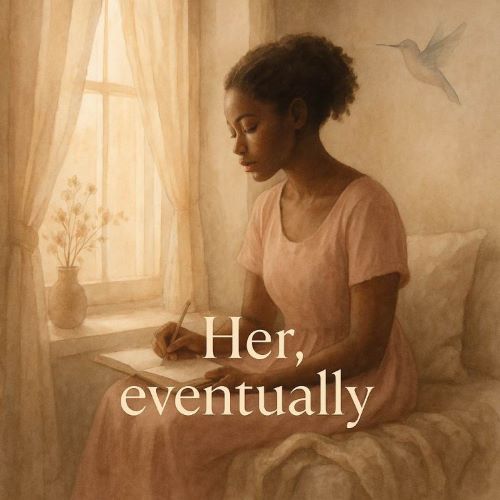CHAPTER ONE- OF THINGS FORGOTTEN AND DESPISED
Once again, Jumai Diane Uwodi faced the stark reality that, indeed, she was worth less than an antiquated piece of furniture. Her life was a series of unfortunate events: first, her conception had been a deplorable mistake borne out of an ill-conceived belief that because her father, a man who she was sure existed due to the science of it all and the apparent fact that her mother was no Mary, claimed to have loved her mother, he would marry her. Her birth was also a calamitous error—her mother had found out too late to do anything about it.
Her birth caused a rift in the family, and five years later, her mother took her life; they said it was depression. Her grandfather, her mother’s father, wanted nothing to do with his “bastard” granddaughter, even after his own daughter had taken her life. But when his wife, Diane’s step-grandmother, died two years later, Diane was the only one left with him, so, as a matter of course and nothing more, not even guilt, a rapport was established between them.
For the next eight years, Grandfather saw to her education and well-being, and in return, she kept the house and looked after him. No deep emotional bond existed between them; their relationship was purely transactional. Most days, the practiced ease with which they related made it seem that all was forgotten, but on the days he slipped, when his eyes disturbed the mechanical aura, she was reminded that nothing was forgotten; he still despised her. Perhaps he had a right to, after all she was a gnawing reminder of all he had lost
Now, just two days after her grandfather had gone the way of his ancestors, her uncles and aunties indiscreetly debated what to do with her. It was familiar territory, and she should be used to it, but it was simpler to be loved or hated. To be unnecessary or unwanted, not worth hating nor loving, was more than just a feeling; it was a verdict: She would always be the girl forgotten, the shadow in a room full of light. But wasn’t she a hypocrite? Her grandfather had died, and she had felt nothing but shock, which had been swiftly replaced by relief and a feeling of freedom. Everyone would die eventually; this was hardly her first brush with death.
Not many visitors came to greet the family; grandfather had been a hard man to love, and to people who weren’t family or friends, there was no obligation. The burial took place the day after he died in Obagu exactly as he had instructed: no wake-keep, no ceremony: “Just dig a hole, say a prayer, say goodbye and be done with it,” he had said.
What Grandfather had lacked in liquidity, he made up for in virgin lands, and his children were more than eager to lay their stakes to them. The first order of business, however, was the house where Grandfather had lived and died, and as always, the matter of her residence was incidental.
The oldest of Grandfather’s children, Uncle Amodu, spoke first. “Well, something needs to be done about Diane here. It goes without saying that this property will be sold.” His tone was detached, as though the decision were a mere formality.
“I agree,” echoed Uncle Desmond, the second-born. “The community chief is already eyeing the property. The sooner we make a decision, the better.”
Diane stood out of sight but within earshot, with her cousin Nona, the only one of her cousins she considered a friend. “Psst, Diane, they’re talking about you,” Nona whispered. Diane nodded. Her palms were sweaty, her thoughts racing through different possible outcomes at breakneck speed. She had been foolish to think she’d continue living here. The death of her grandfather meant a quit notice, though she had never considered it. Perhaps, she thought, she should have mourned him.
She had concluded that Aunty Omanyo, her grandfather’s last and only child from his second marriage, would continue to stay in the house, and like always, she would earn her keep. How foolish of her: Aunty Omanyo utterly detested Lokoja; she always said it was a town to come and die, not a town to live in, that people who stayed there had an unbreakable bond with drear. She had only left Lagos because of Grandfather’s health, and now that he was gone, nothing was keeping her.
“I hope you come and stay with us, Diane. That way, I can finally have a sister. My brothers are despicable.” Nona held her hand and pouted. Diane allowed her hand to be held. Nona’s naivety was laughable; Diane knew what reality was. At fifteen, she had learnt the hard way that life often gave the opposite of what one desired.
“The child has suffered; she needs stability,” Aunty Uyo, Nona’s mother, the most outspoken of Grandfather’s daughters, began. “And as you are all aware, Max and I are going through a rough patch, otherwise, it would have been pure joy to take her on.” She finished with a hint of a smile on her face. Aunty Uyo had always been sympathetic towards her, and whatever clothes and gifts she ever received were from her. She was the one to augment but never actually take on full responsibility.
“Oh, Diane. I must get my mom to change her mind. Out of all of us, she listens to me best.” Diane forced a smile and said nothing.
Uncle Desmond said he didn’t have room in his house for an extra person; Aunty Rita, the fourth, said it would be inconvenient since she was unmarried and busy. Aunty Omanyo cleared her throat, and there was silence.
“If no one takes responsibility for Diane, I will.” Diane was not surprised; Omanyo had been the only one who cared about her, but she also knew that of all her siblings, she was the most financially unstable.
“Don’t be foolish, Omanyo. You still rely on stipends from me to make it through the month; how do you propose to take care of a teenage girl?”
“I don’t like to be insulted, Rita. But why are we all acting like Diane isn’t family? She’s our sister’s child, not some random stranger picked from the side of the road. We all must pitch in. She will stay with me, and the rest of you can support her with money,” she argued.
“Omanyo, you’ve only just finished your service. Do you think you have what it takes to handle a teenage girl?”
“I don’t see what choice I have here. The rest of you, married people with children much older than she, simply want nothing to do with her. Unfortunately, I can’t shirk my responsibility on account of space.”
“Omanyo!” Amodu warned. Omanyo shrugged defiantly.
“I’ll do all of us one better.” Uncle Desmond started. “Our father traced Diane’s father, and he was willing to take her. He informed me of this two months ago and even urged me to meet with him. We’ve met up a couple of times. He claims not to have known of Julia’s pregnancy. He lives and works in Abuja and has a family of his own.”
“How convenient,” Omanyo scoffed. “Are you seriously suggesting we bundle her up and waybill her to a stranger?” Omanyo nearly screamed. “Don’t you think he is fifteen years too late? For all we know, he could be a serial killer. And what about his wife? Do you have any idea how she will treat her?”
“Oh, stop being dramatic,” Desmond snapped. “We’ve checked him out. He’s met with Dad and made it clear he wants to be involved, and don’t forget that we knew him before things went south with Julia.” Desmond was getting angry.
“Emphasis on knew,” Omanyo retorted.
“Omanyo, you don’t have a say in this. Since Dad went through the trouble and Joe, wasn’t that his name?, seems to want to reconnect with his daughter, we can’t stop him. A parent shouldn’t be denied access to their child. Desmond, finish the arrangement, and let us know when it would be good to bring her,” Amodu said finally.
Tears brimmed in Omanyo’s eyes, and she shook her head, walking out of the room.
Nona muffled her squeal with her hands; she was excited that Diane would move to Abuja. “We’ll hang out all the time. Maybe I can get Mom to enroll you in our school. It’ll be so much fun!” She yelped.
Diane was in another world; she had long learned to control her emotions, living with her grandfather had taught her that, but in the moment, she wanted to cry. The boulder in her throat was a testament to that. Aunty Omanyo couldn’t help her; she tried but failed. Uncertainty was an enemy with whom she too frequently sparred.

Hi love, Thank you for being here, and for reading Her, eventually. This story is only just beginning. There are more chapters to come, more moments of pain, hope, truth, and tenderness. Together, we’ll keep exploring the emotions we often carry but rarely voice.
You are not alone here. This space is soft, safe, and made for hearts like yours. If you have thoughts, questions, or stories you’d like us to sit with, I’d love to hear from you: Reach out here- https://www.justhummingbird.com/contact-me/ Or leave a message through this form- https://stats.sender.net/forms/e7ly1a/view
With warmth,

Just Hummingbird

